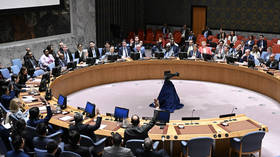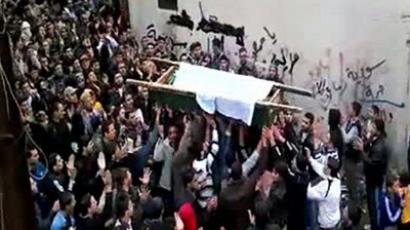Paris fires warning shot
Paris talks about humanitarian intervention in Syria, as the country faces more sanctions from the Arab League countries, but it appears even the armed opponents of Bashar al-Assad’s regime strongly oppose any interference from outside.
While the Arab League is discussing sanctions against Syria, France has become the first western country to suggest intervention on a humanitarian basis.Paris has talked about the possibility of creating humanitarian corridors or zones which sounds suspiciously like the no-fly zone enforced over Libya prior to NATO intervention there. Still, while the attempt is similar, the situation is different from Libya’s, because while the no-fly zone over Libya was sanctioned by the UN, actual sanctions against Syria are strictly opposed by Russia and China.“Even among the opponents to the ugly Assad regime, a lot of opponents in Syria will actually not welcome an intervention by western forces,” even if it comes in the shape of fellow-Muslims in the Turkish army, predicts professor of political science at Paris West University Dr. Pierre Guerlain.So, however anti-Assad the opposition in Syria could be, it doesn’t want foreign troops in the country.Presumably, there will be co-operation between the Arab League and the EU on the Syrian question. Germany refused to participate in the Libya operation so debate over Syria could be expected in the EU. Arab states will definitely not vote unanimously in favor of intervention in Syria, but a diversion of public attention worldwide from ongoing events in Bahrain, Egypt, Yemen and others will be welcomed by some regimes anyway.The French Foreign Minister Alain Juppé said the Syrian National Council, which looks a lot like Libya's NTC, is now the legitimate organization for holding dialogue. But it appears that in the case of Syria, the UN Security Council is not likely to provide NATO with the fig leaf of an adopted resolution as an excuse for intervention.“When you have a military dictator, he cannot run the country by himself. He must be supported by important forces, usually the army. And in case of Syria – supported by the army, and also by Sunni segment of the populations”, explains Professor Guerlain.“If he is not supported by the army anymore, he will of course disappear, because one leader cannot operate by himself.”Guerlain concludes that the regime in Syria could collapse from within because of army desertions and any attempts to intervene from the outside will be “encountered by many forces.”
The consequences of intervention in Syria would be catastrophic, because it will bring in Syria’s allies – namely Iran and Hezbollah – says Lawrence Davidson, a professor of history at West Chester University in the US and an expert on the Middle East.“I don’t know if they, the political leaders, actually thought through the consequences of that kind of action,” he said, explaining that politicians have not calculated who would possibly replace President Bashar al-Assad.“It is just totally irresponsible,” he claimed, adding that the current regime in Syria controls the situation far better than the west presents it.
“This is a repeat of the Libyan game play and Turkey is involved in both cases,” says Professor Paul Sheldon Foote of California State University, who's lived and worked in several Arab countries.He says the west believes they already have Turkey in line, providing safe military camps within Turkish borders to the Free Syria Army, which plans to carry out attacks and kill Syrian servicemen.“Sarkozy certainly needs a distraction from the economic disaster that he is facing,” argues the professor, noting current French economic difficulties. In the meantime the Arab League has again failed to protect Arab nationals – exactly the way it did in Palestine and Libya. The organization has been protecting US interests in the Middle East since its creation after WWII, believes Professor Sheldon Foote.














